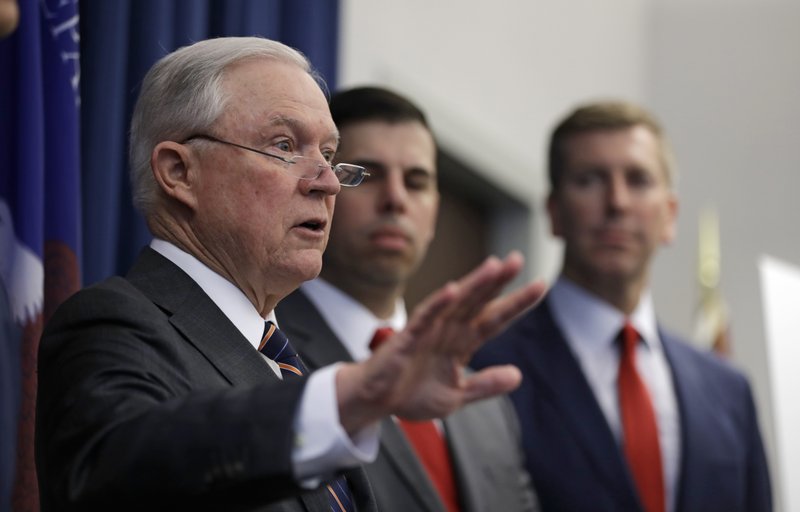WASHINGTON -- Attorney General Jeff Sessions pushed back against President Donald Trump's recent attack on him -- namely that Sessions never took control of the Justice Department -- and said Thursday that he would not be influenced by politics in the job.
"While I am attorney general, the actions of the Department of Justice will not be improperly influenced by political considerations," Sessions said in a rare public statement.
"I took control of the Department of Justice the day I was sworn in, which is why we have had unprecedented success at effectuating the President's agenda -- one that protects the safety and security and rights of the American people, reduces violent crime, enforces our immigration laws, promotes economic growth, and advances religious liberty," the statement said.
The president has long expressed regret over naming Sessions to be attorney general because he suggested Sessions failed to protect him by recusing himself from the government's continuing investigation into Russian interference in the 2016 elections and any possible coordination with members of Trump's campaign.
"I put in an attorney general that never took control of the Justice Department," Trump said in an interview with Fox & Friends recorded Wednesday and aired Thursday morning. "Jeff Sessions never took control of the Justice Department and it's a sort of an incredible thing."
The president later asked: "What kind of man is this?"
Sessions appeared to answer that question: "I demand the highest standards, and where they are not met, I take action," he said in the statement.
Trump said the only reason he gave Sessions the job was because he had been an early prominent supporter of his presidential campaign. "I felt loyalty," Trump said.
Sessions became attorney general in February 2017, and recused himself from the Russia inquiry less than a month later. Because Sessions is recused, the investigation, led by special counsel Robert Mueller, is overseen by Deputy Attorney General Rod Rosenstein. If Sessions left the Justice Department and the Senate confirmed a new attorney general, that person probably would take control of the Russia inquiry.
Trump declined Thursday to say whether he plans to fire Sessions or Rosenstein.
Sen. Lindsey Graham, R-S.C., told reporters that he thinks it's "very likely" that Trump will replace Sessions but said it would be unwise for him to do so before the November midterm elections.
"The president's entitled to an attorney general he has faith in, somebody that's qualified for the job, and I think there will come a time, sooner rather than later, where it will be time to have a new face and a fresh voice at the Department of Justice," Graham said. "Clearly, Attorney General Sessions doesn't have the confidence of the president."
Senate Judiciary Chairman Charles Grassley, R-Iowa, said Thursday that he could find time to hold hearings on a new nominee later this year after the Senate votes on Trump's Supreme Court nominee, Judge Brett Kavanaugh.
That was a change in posture from a year ago, when Grassley made clear to the White House that he wouldn't have time to hold hearings on a possible replacement for attorney general. Grassley said he was not advocating for a change at the Justice Department but simply responding to questions about timing.
"I'm just very generically telling people that I've got time for hearings this fall," he said.
Asked whether he still has confidence in Sessions, Grassley said: "Let's put it this way, he's a good friend."
Other Republicans made clear that they are still in Sessions's corner.
Sen. John Cornyn of Texas, the No. 2 Republican in the chamber, told reporters that it would be difficult to confirm another attorney general in the fall. He did not specify whether he was talking about before or after the midterm elections.
"We don't have time, nor is there a likely candidate who could get confirmed, in my view, under these current circumstances," Cornyn said. "I think it would be good for the attorney general and the president to try to work out their differences.
"I know this is a difficult position for [Sessions] to be in, but I think it would be bad for the country, it would be bad for the president, it would be bad for the Department of Justice for him to be forced out under these circumstances. I hope he stays the course, and I hope cooler heads prevail," Cornyn added.
Those sentiments were echoed by Republican Sen. Susan Collins of Maine.
"It certainly would send the wrong message, because the basis of the president's criticism of the attorney general is that he recused himself -- appropriately so -- from the Russia investigation and is letting the special counsel undertake his necessary work," Collins said.
Information for this article was contributed by Eileen Sullivan of The New York Times; and by Devlin Barrett, John Wagner and Seung Min Kim of The Washington Post.
RELATED ARTICLE
http://www.arkansas…">Cohen's 'flipping' vexes Trump
A Section on 08/24/2018

